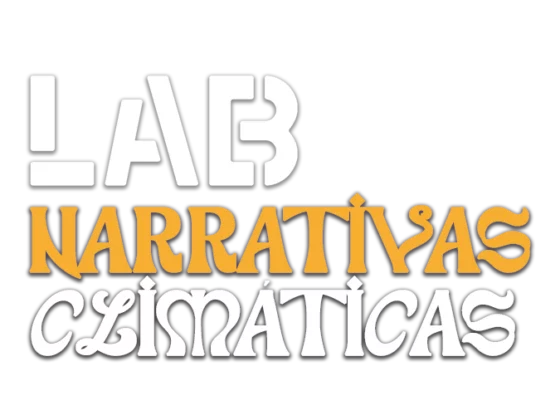
CLIMATE NARRATIVES LAB
The Global South at the Heart of Solutions for Well-Being
The Instituto Procomum (IP), a Brazilian civil society association, in partnership with Surge X Media, a Nigerian organization, have joined forces to promote the first international meeting of Climate Narratives LAB: the Global South at the center of solutions for well-being.
This meeting is a partnership with the Nigerian climate justice organization Surge Africa through its strategic communication arm, Surge X Media, and is part of a broader agenda of LAB Procomum to strengthen the climate justice agenda in the Baixada Santista region, in São Paulo, and of Instituto Procomum to connect and strengthen both community and institutionalized solutions, aiming for the convergence so necessary at this moment.
The Climate Narratives Lab will take place in two phases:
1
International Meeting of the Climate Narratives Lab which will occur between June 19 and 20, 2024, at LAB Procomum in Santos. The meeting is open and free, with the participation of guests from Baixada Santista, from across the country, and from Nigeria. Check out the schedule below.
2
Citizen Lab: Climate Narratives Lab, a flash laboratory that will take place on June 21 and 22 at LAB Procomum in Santos, focused on prototyping ideas and projects.
About the institutions:
Instituto Procomum (IP) is a non-profit organization that has existed since 2016 and is committed to the transition to a fair, democratic and plural society model. We do this by investing in creativity and citizen innovation, strengthening networks and communities and investing in new protagonists, thus expanding the possibilities of a truly popular democracy. Since 2017, we have maintained a citizen laboratory in Santos, São Paulo, Lab Procomum. Through LAB Procomum, we are connected and mobilized to strengthen citizenship and the quality of life of the population in the Baixada Santista region. Since 2019, we have been working, through community activation and citizen innovation methodologies, with the effects of the climate emergency, environmental racism and their impacts on the population – notably people who already suffer from less access to basic rights such as decent housing, sanitation basic, and others.
Based on previous experiences, and aware that the climate crisis is here to stay and requires systematic and intentional governance for mitigation, adaptation and a transition of society model, in 2024 we are building a permanent agenda of training, articulation and advocacy around climate change, its effects and the search for solutions. Find out more here:
Climate Justice Community Network
Surge X Media is a strategic communication platform that promotes impactful narratives, cultural movements, and narrative shifts in the global south. Surge X is a project of Surge Africa, a Nigerian organization operating in various African countries, designing and implementing innovative measures to enhance climate adaptation approaches through policies, media, and resilient development. Recognizing that climate change is multifaceted and must be tackled with strategies at various societal levels, their programs are designed to strategically advance climate resilience, influencing and promoting an inclusive decentralization of people, energy, economy, and governance.
Surge Africa has a regional presence in Africa, operating in Nigeria, Ghana, Kenya, and South Africa through several programs and initiatives. This is the first time the organization is coming to Latin America, through a program that will continue on the continent to promote shared values of justice and equality in the defense of climate justice.
Programme
International Meeting Climate Narratives LAB
Climate Narratives LAB
If you are looking for:
Strengthening community ties and articulate a vision and action plan for climate adaptation which includes the knowledge and voices of the most affected communities;
Broaden and diversify voices and enhance technical and political understanding of climate change, its causes, effects, and related international agreements for community leaders and local organizations
Promote exchanges with community organizations in Brazil and Africa, recognizing that solutions to climate change can be shared and adapted in different contexts
Then register here:
June 19, 2024
6:00 PM – 7:30 PM
The Climate Crisis and the Global South: What Model Brought Us Here?
The causes, the perpetrators, the predatory colonial model.
Participants:
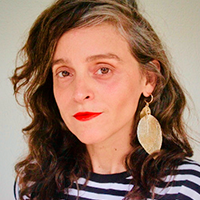
Marina Guzzo
UNIFESP
Moderator
Artist and researcher Marina Guzzo focuses her creations on the interface between the body and the landscape. She is an Associate Professor at Unifesp on the Baixada Santista Campus and a researcher at the Body and Art Laboratory at the Institute of Health and Society.
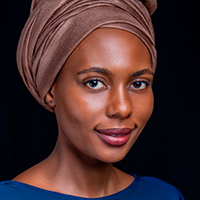
Nasreen Al-Amin
Surge Africa
Speaker
Nasreen Al-Amin is the founder and executive director of Surge Africa, an environmental sustainability expert in Nigeria, with years of experience in the fields of policy, diplomacy, development, and communication.
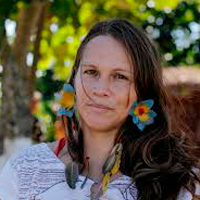
Simone Takuá
Flora Tupi
Speaker
Simone Takuá, daughter of a midwife, was born and raised in the village within the Guarani Mbya culture. She holds a degree in Pedagogy from Peruíbe FPBE College and is an important leader and phytotherapist of the Piaçaguera village in Peruíbe, São Paulo.
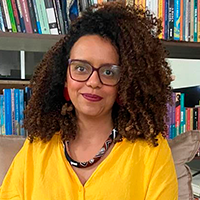
Ana Sanches
Instituto Pólis
Speaker
Ana Sanches is a PhD candidate in Social Change and Political Participation at the School of Arts, Sciences, and Humanities at the University of São Paulo (USP). She researches Decolonial Ecologies, Participation and Social Change, Justice, and Environmental Racism. She works as a project advisor at Instituto Pólis and as an activist in the Black and socio-environmental movements in Brazil.
7:30 PM – 9:00 PM
Cocktail and Artistic Presentation

Wescritor
Wescritor is an indigenous rapper and multi-artist from the Tupinambá people of Olivença, Bahia. Born in São Vicente (SP), Wes addresses indigenous issues and reverberates ancestrality in his rhymes. He moves between lyrics of resistance, reflection, love and feelings.

Nhaderu Rembiguai Choir
The Nhaderu Rembiguai Choir belongs to the indigenous community of Paranapuã, an indigenous territory that resists in the municipality of São Vicente, São Paulo.
June 20, 2024
9:00 AM – 10:00 AM
Breakfast and Welcome
10:00 AM – 11:30 AM
What is the magnitude of the problem when it comes to the climate crisis? Perspectives on data and information in the construction of effective solutions.
Participants:
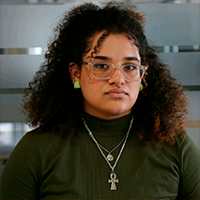
Thaynah Gutierrez
Rede para uma Adaptação Antiracista
Moderator
Thaynah Gutierrez Gomes, 25, is a public administrator with a degree from FGV-EAESP and a postgraduate degree in Energy Transition and Human Rights from CLACSO Ecuador. She works as executive secretary of the Network for Anti-Racist Adaptation and as a consultant on culture, social participation and climate change. She is a member of the Omó Nanã Institute, which works on socio-environmental and climate issues based on the contributions of African matrices.
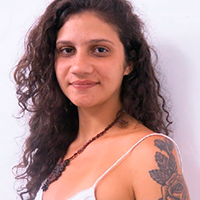
Clara Sacco
data_labe
Speaker
Clara Sacco is the Executive Director responsible for institutional development and co-founder of data_labe. She holds a Bachelor’s degree in Media Studies from the Federal Fluminense University and has a professional trajectory related to projects that connect communication, technologies, cultural production, youth, and political mobilization.
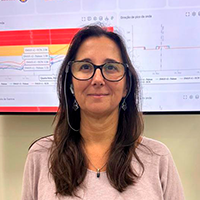
Alexandra Sampaio
Unisanta
Speaker
Graduated in Engineering, with a master’s degree in Environmental Sciences from PROCAM/USP, Alexandra is a lecturer and coordinator of the Hydrodynamic Research Center at the Faculty of Engineering of the Universidade Santa Cecília in Santos. She coordinated the implementation of the first operational-level water quality prediction system in Brazil for the beaches of Santos, São Vicente, and the estuarine zone.
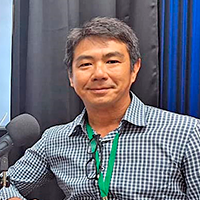
Fábio Tatsubô
Prefeitura de Santos
Speaker
Fábio Tatsubô has been working in journalism since 1995. He served as coordinator of the Transparency department and Head of the Ombudsman, Transparency, and Control Department (OTC) from 2017 to 2022. Currently, he is the coordinator of the SDG Committee and works on monitoring the Government Plan.
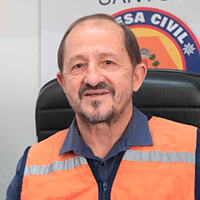
Coronel Daniel Onias
Defesa Civil de Santos
Speaker
Lieutenant Colonel of the Santos Civil Defense, formerly worked at the 17th Fire Department Battalion. In 1988, he coordinated the Civil Defense of São Sebastião, in the northern coast.
2:00 PM – 3:30 PM
Prevent, anticipate, adapt, and change. How to build convergent solutions and shared governance in solutions?
Participants:
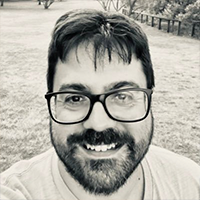
Pedro Torres
UFABC
Moderator
Pedro Torres is a Social Scientist and Urban Planner. He is currently a Professor in the Graduate Program in Environmental Sciences (PROCAM/USP) and a Postdoctoral Fellow in Territorial Planning at the Federal University of ABC (UFABC). He works on management and planning topics, with an emphasis on fair adaptation to climate change/climate justice and coastal cities.
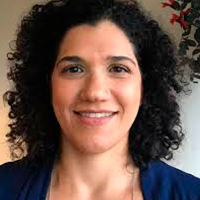
Samia Sulaiman
Secretaria Nacional das periferias
Speaker
Samia Sulaiman is the General Coordinator of the Articulation Coordination of the Risk Mitigation and Prevention Department of the National Peripheries Secretariat of the Ministry of Cities. She holds a Master’s degree in Planning and Management of Natural Risks from the University of Alicante, Spain. She is a researcher at the Risk Management Laboratory (LabGRis-UFABC) and the Interdisciplinary Research Center on Disasters (NUPED/UFRN).
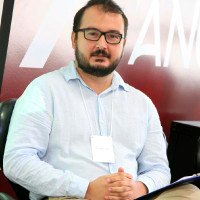
Mario Bueno
Prefeitura Municipal de São Vicente
Speaker
Mario Bueno holds degrees in Marine Sciences (Unifesp) and Environmental Engineering (Unifesp), and a master’s degree in Bioproducts and Bioprocesses (Unifesp). He works in the field of innovation and entrepreneurship in engineering (Unesp, CREA, VUNESP). Currently, he serves as the Deputy Secretary of the Environment at the Municipality of São Vicente.
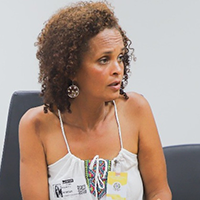
Rosilene Santos
Union of Affected in São Sebastião
Speaker
Negah Rosi is a resident of the north coast of São Paulo, an activist in the Union of Those Affected in São Sebastião and the Women’s Association of Vila Sahy since 2001. She is also a culinary specialist in organic food and a producer of medicinal herbs for therapeutic treatments. She won the Ozires da Silva Award from FGV with the Brotar Network project in 2019.
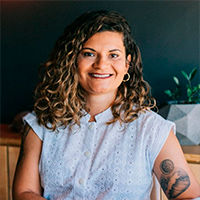
Danielle Almeida de Carvalho
Ph.D. Researcher at INPE
Moderator
Biologist and specialist researcher in socio-environmental interface, she consults and conducts academic work related to climate change adaptation, governance, subnational climate policies, and gender equity. She is studying climate governance in the coastal zone in the Baixada Santista Region and is participating in the development process of the Baixada Santista Regional Adaptation and Resilience Plan.
4:30 PM – 5:30 PM
Understanding the panorama and Challenges
Participants:
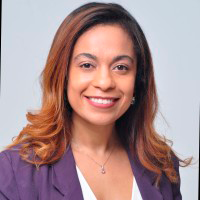
Tatiane Matheus
Climate Justice Lab
Moderator
Tatiane Matheus is a researcher in Climate Justice, Gender, and Environmental Racism. She is the author of the book “Feminine Voices for Green and Inclusive Economy”. With over 20 years of experience in journalism, she is a responsible leader at the BMW Foundation and a member of the Gender and Climate Working Group at the Climate Observatory. She is currently pursuing a postgraduate degree in Rights, Inequalities, and Climate Governance at UFBA.
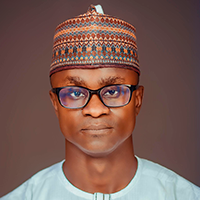
Muhammad Shamsuddin Ibrahim
Surge Africa
Speaker
Muhammad Ibrahim is a multi-talented individual with expertise in resilience building, climate justice, digital storytelling, and grassroots organizing. He is recognized for his award-winning digital activism and currently focuses on climate adaptation, climate mobility, clean cooking, and environmental governance. With a strong commitment to research, policy, advocacy, and practice, Muhammad aims to enhance capacity and understanding for a resilience and clean energy transition. He works as a resilience associate at Surge Africa Organisation and has six years of experience in pro-poor social development programs and four years of experience implementing donor-funded projects. Muhammad is skilled in stakeholder engagement, communication, and human relations and enjoys engaging with marginalized climate-vulnerable communities.
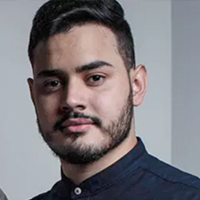
Leonardo Leal
Sleeping Giants
Speaker
Leonardo Leal is the co-founder and Communications Director of Sleeping Giants Brasil, a progressive organization of digital activists that claims to anonymously combat hate speech and misinformation on the internet. In four years, the movement has garnered support from over a million followers on its social media platforms and has raised awareness among 1054 companies, with the total demonetized from harmful discourse exceeding R$200 million.
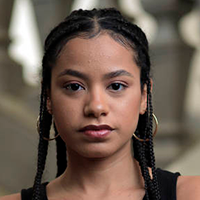
Thux Oliveira (Tuane)
Perifa Connection
Speaker
Thux Oliveira, also known as Tuane, is the Executive Director of PerifaConnection, a platform aimed at challenging narratives about Brazilian peripheries. Hailing from the favela of Duque de Caxias, she holds a degree in law from UFRJ and specializes in the areas of Right to the City, land access, popular advocacy, and legal sociology. She is an academic researcher in the fields of agrarian reform, housing rights, social movements, and popular legal assistance.
5:30 PM – 7:00 PM
Strategies Strategies for Effective Climate Communication
Participants:

Tatiane Matheus
Climate Justice Lab
Moderator
Tatiane Matheus is a researcher in Climate Justice, Gender, and Environmental Racism. She is the author of the book “Feminine Voices for Green and Inclusive Economy”. With over 20 years of experience in journalism, she is a responsible leader at the BMW Foundation and a member of the Gender and Climate Working Group at the Climate Observatory. She is currently pursuing a postgraduate degree in Rights, Inequalities, and Climate Governance at UFBA.
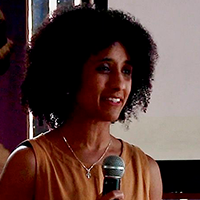
Nathalia Rocha
Morada Comum
Speaker
Nathalia Rocha is the Executive Director of Morada Comum, a global network that promotes the common good for the environment by strengthening and helping to create civic institutions that empower people to collectively build the common good for the environment.
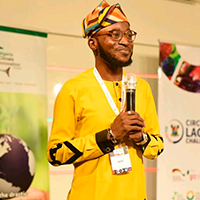
Daniel Akinola Oladoja
Strategic Communications Expert
Speaker
Daniel is a strategic communications expert with more than five years of experience in the field of communications and environmental sustainability.He is committed to climate justice and sustainability as a vehicle for green, resilient, and inclusive development that truly democratizes the dividends of climate wealth to the most vulnerable in Africa.
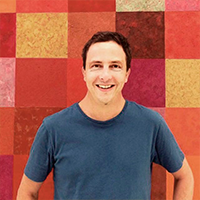
Adriano Liziero
Geopanoramas
Speaker
Adriano Liziero is a geographer, text editor, and environmental documentarian. He works in the educational publishing market, with works developed for the largest publishers in Brazil. He is the creator of Geopanoramas, a sustainability communication project with over 100,000 followers on social media. He has been recognized by the Inter-American Development Bank (IDB) as an author of educational innovation in Latin America. Currently, he is supported by the Open Society Foundations in environmental and climate communication initiatives and develops educational content focused on responsible energy transition, with support from the Climate and Society Institute at Think Thank Aurora Lab. He is writing the book “Somos Paisagem” with Bambual Editora.
Climate Change Laboratory
On May 21st and 22nd, 2024, the 20 individuals selected after an open call will comprise the team of the 2024 Climate Narratives Lab. This will be an immersive experience in the form of a rapid laboratory aimed at prototyping low-cost and easily implementable initiatives that draw attention to the urgency of climate change in the Baixada Santista region.
The selection process sought individuals with experience in climate solutions and impactful communication to develop prototypes and communities of practice addressing the urgent communication of local climate phenomena.
Here is the list of selected participants for the 2024 Climate Narratives Lab.
Participants, who will receive a stipend of R$500, resources for prototypes, assistance with transportation and meals during the days of activity, will decide on actions and prototypes within predefined categories. They will engage in an immersive process, sharing ideas and knowledge, and receiving mentorship. The goal is to create communities of practice to promote a sustainable and equitable Baixada Santista.
A citizen laboratory is a collaborative and experimental space where individuals from different backgrounds and knowledge areas come together to develop innovative solutions to social and environmental problems. These laboratories are characterized by the active participation of civil society, which contributes its knowledge, experiences, and creativity. Thus, we recognize that every territory already has makers, creators, and innovative agents, not necessarily having all the ready answers.
1.
Collaboration and Co-creation:
Involves collective participation in the process of creating and developing solutions, promoting the exchange of knowledge and experiences among participants.
2.
Diversity of Profiles:
Selects individuals with different skills, knowledge, and experiences, ensuring a multidisciplinary and inclusive approach.
3.
People-Centered Methodology:
Prioritizes the needs, ideas, and proposals of participants, creating an environment of learning and mutual development.
4.
Mentorship and Guidance:
Provides support and guidance from mentors and experts to assist in the development of proposed solutions.
5.
Resources and Support:
Provides stipends, resources for prototyping, and logistical support, such as meals and transportation assistance, to facilitate effective participation.
6.
Care:
Providing individual and collective care actions throughout all days of the laboratory, with an interdisciplinary and integrative focus centered on the unique and common needs of the people involved in the laboratory.
For us, a citizen laboratory is an open innovation environment where civil society can proactively engage in creating solutions to common challenges, reinforcing collective well-being and social justice.
The Open Call
The Procomum Institute (IP) and SurgeX opened a call for the LAB Climate Narratives 2024 in Baixada Santista, a lightning laboratory with face-to-face meetings in Santos-SP in May. The laboratory aims to select 15 to 20 individuals impacted by climate issues or with experience in climate solutions and impactful communication to develop prototypes and communities of practice. Participants will receive a stipend, resources for prototypes, transportation assistance, and meals during the activities. The initiative is part of a larger agenda for climate justice and territorial and international articulation, seeking to promote a sustainable and egalitarian Baixada Santista.
We seek to develop low-cost and easy-to-implement initiatives that attract the attention of authorities, public agencies, and the media to the urgency of climate change in Baixada Santista. Especially initiatives that protect the lives and dignity of affected people, such as residents of areas prone to floods, inundations, and landslides. Proposals can be new or strengthen existing projects but must be viable and capable of forming communities of practice that continue to work on this agenda throughout the year.
The categories in which the project could fit were:
1.
Digital activism, internet, and international cooperation
2.
Data and common science
3.
Narratives, art, and activism
We live in a region that faces severe impacts of climate change, such as rising sea levels, heavy rains, excessive heat, and industrial pollution. There is a scientific consensus that global warming is caused by human activities, with over 97% of studies agreeing. In the last ten years, 93% of Brazilian municipalities have been affected by natural disasters, affecting millions of people. Despite this, there is misinformation and lack of adaptive action in many places. The Procomum LAB seeks to create impactful prototypes to sensitize the media and authorities about the climate crisis and highlight community solutions.
The Laboratory for selected participants will take place on the 21st and 22nd and is a follow-up to the open International Meeting that will take place on the 19th and 20th. It is a methodology developed from the creations that emerge from communities generating better living conditions, which we call citizen innovation.






